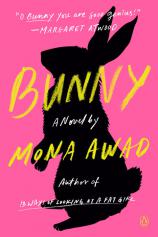Bunny
Review
Bunny
Virginia Woolf wrote that “literature is strewn with the wreckage of men who have minded beyond reason the opinions of others” and “every secret of a writer’s soul, every experience of his life, every quality of his mind, is written large in his works.” Both these writerly quotes find purchase in Mona Awad’s second novel, BUNNY, a story about writing, wreckage, opinions, souls and much more. Whereas Woolf examined issues like gender and genius in her work with a realistic and steady hand, Awad tackles some of the same themes with a fantastically surreal and disorienting style. The book is clever and not above a bit of silliness, with its tiny cupcakes, precious outfits and millennial speech patterns. It is also full of dark magic, violence and terror, making it deliciously dangerous and deadly serious.
"Awad balances very well the absurdly funny with razor-sharp and serious insight. The book would make Woolf proud in its scathing look at female relationships and gendered expectations, and delight Kafka with its weird honesty."
Samantha Heather Mackey is beginning her second year in the competitive and close-knit MFA program at Warren University. She is in a fiction cohort with four other young women collectively known as the Bunnies. She has nicknamed them Cupcake, Vignette, Creepy Doll and Duchess, but even they mostly refer to each other affectionately as “Bunny.” After a year of feeling like an outsider, relying completely on her only friend Ava, and the fallout from an awkward night with one of her professors, Samantha is surprised to be invited by the Bunnies to their “Smut Salon,” which she believes to be a very intimate writing workshop. While some reading of pieces takes place at the Salon, the real purpose is the creation of a dream man, made by blood magic and the desires of the Bunnies, not to mention a sacrificial rabbit.
And so begins Samantha’s journey down the proverbial rabbit hole, following the Bunnies, real and imagined. Despite her writer’s block and unclear but clearly tense family background, or perhaps because of them, Samantha is easily drawn into the world of the Bunnies. She finds herself participating in, even perfecting, their rituals, and losing sight of who she is and the importance of her friendship with Ava.
Taking Kafka’s axe to the frozen sea within and to the necks of campus rabbits, Samantha and the Bunnies drink original concoctions, seek out the cutest cafés, braid each other’s hair, and, yes, do some writing. When a mysterious man named Max shows up and begins a relationship with Ava, Samantha is confronted with her terrible acceptance of the Bunnies’ deeds and the power of her own frightening imagination. By the end, readers must discern fantasy from reality along with Samantha, resulting in a jarring and sensational look at the acceptance of oneself in the face of judgment, the potency of creative expression, and the secrets of fiction writers.
Ultimately, BUNNY is hard to describe but easy to recommend. Awad balances very well the absurdly funny with razor-sharp and serious insight. The book would make Woolf proud in its scathing look at female relationships and gendered expectations, and delight Kafka with its weird honesty. Samantha is a frustrating cipher, but Awad’s writing is so charming and strong, luminous and smart, uncompromising and mischievous, that even the Bunnies would be jealous.
Reviewed by Sarah Rachel Egelman on June 14, 2019




